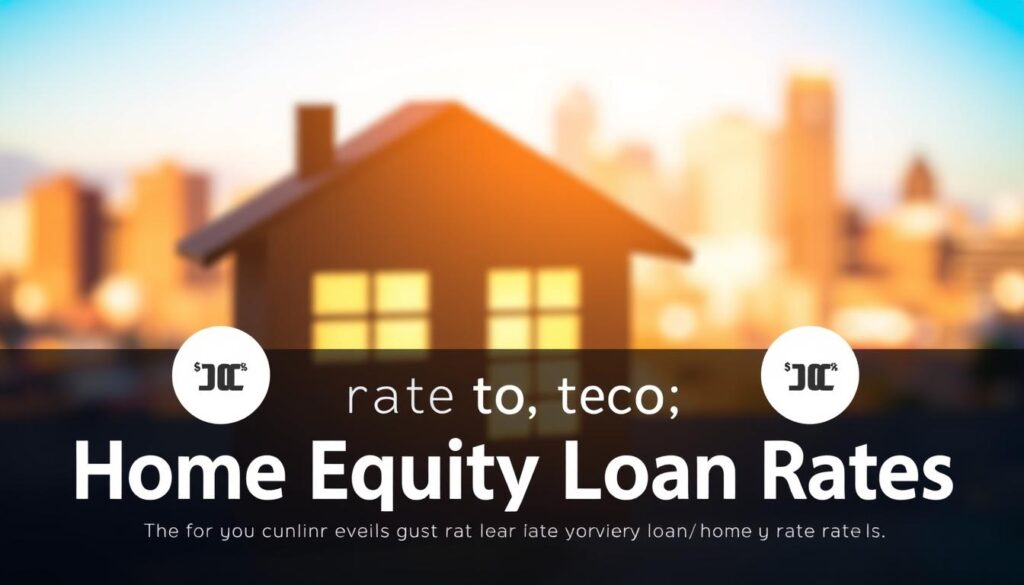Discover Top Home Equity Loan Rates in the US
Did you know the right loan rates can save homeowners thousands? Millions of homeowners use their home equity for renovations, debt pay-off, or unexpected costs. Finding the best rates is key.
We’ll show you how to find the best rates in the US market. Our aim is to give you the knowledge to make smart financial choices.
Key Takeaways
- Understand the current market trends for home equity loan rates
- Learn how to compare loan rates effectively
- Discover the benefits of choosing the right loan rate for your needs
- Identify key factors that influence loan rates
- Explore strategies to secure the best loan rates
What is a Home Equity Loan?
Homeowners often wonder about home equity loans. These loans let you borrow money using your home’s value as security. It’s a way to access funds based on your home’s equity.
Definition and Overview
A home equity loan is like a second mortgage. It lets you get a big sum of money based on your home’s equity. Home equity is found by subtracting your mortgage balance from your home’s market value. For example, if your home is worth $200,000 and you owe $120,000, you have $80,000 in equity.
How It Works
Home equity loans let lenders give you a loan based on your home’s equity. You get the money all at once. Then, you pay it back over a set time, usually with a fixed interest rate. This makes your payments steady and easy to plan.
Some benefits include:
- Access to a lot of cash
- Potential for lower home equity loan interest rates than other loans
- Fixed repayment terms
When looking at home equity loans, it’s key to find the lowest interest rates for home equity loans. Shopping around can help you save money over time. Compare home equity loan rates from different lenders to get the best deal.
Understanding Home Equity
For many homeowners, understanding home equity is the first step towards unlocking their property’s financial potential. Home equity is the difference between your home’s market value and your mortgage balance. It’s a valuable asset that can help you get loans at good interest rates.
What is Home Equity?
Home equity is the part of your home’s value that you own outright. It grows as you pay down your mortgage and your home’s value increases. Lenders usually let you borrow up to 80% of your home equity.
For example, if your home is worth $100,000 and you owe $50,000, you have $50,000 in equity. You can borrow up to 80% of that amount.
Factors Influencing Home Equity
Several factors affect home equity. The main ones include your initial down payment, how fast you pay down your mortgage, and changes in the housing market. Also, renovations or improvements that boost your home’s value can increase your equity.
When you get a home equity loan, your home acts as collateral for the lender. You can use a home equity loan calculator to figure out how much you can borrow based on your equity.
| Factor | Description | Impact on Home Equity |
|---|---|---|
| Down Payment | Initial payment when purchasing a home | Higher down payment increases initial equity |
| Mortgage Payments | Regular payments towards the mortgage | Reduces the outstanding mortgage balance, increasing equity |
| Housing Market | Changes in the real estate market | Appreciation in housing market value increases equity |
Benefits of Home Equity Loans
Home equity loans come with many benefits for homeowners. They can help you get a low interest rate for renovations, unexpected expenses, or any other need.
Lower Interest Rates Compared to Personal Loans
One big plus of home equity loans is their lower interest rates compared to personal loans. This is because your home’s equity secures the loan, making it less risky for lenders. So, they can offer better rates.
Experts say, “The secured nature of home equity loans allows lenders to provide lower interest rates. This makes them a more affordable borrowing option.”
Looking at interest rates, home equity loans are often lower than unsecured personal loans. This can save you a lot of money over time.
Potential Tax Benefits
Home equity loans also offer tax benefits. Sometimes, the interest you pay can be tax-deductible. This can lower your taxable income and your taxes.
Financial advisors point out, “The tax deductibility of home equity loan interest can be a big plus for homeowners, especially in higher tax brackets.” But, it’s crucial to talk to a tax expert to see how it applies to you.
Comparing Home Equity Loan Rates
Home equity loan rates vary a lot, influenced by different factors. It’s key to know how to compare these rates well.
Fixed vs. Variable Rates
Home equity loans have either fixed or variable interest rates. Each type has its own pros and cons.
Fixed Rates keep the interest rate the same for the whole loan term. This can be good when interest rates are going up.
Variable Rates change with the market. They might start lower, but could go up later.
How to Find the Best Rates
To get the best home equity loan rates, compare offers from different lenders.
Here are some tips:
- Check with local banks and credit unions
- Explore online lending platforms
- Consider consulting a mortgage broker
| Lender | Interest Rate | Loan Term | Fees |
|---|---|---|---|
| Bank of America | 4.5% | 10 years | $500 |
| Wells Fargo | 4.25% | 15 years | $750 |
| Quicken Loans | 4.75% | 10 years | $300 |
Understanding fixed and variable rates and comparing offers well can help you get the best home equity loan rate.
Key Factors Affecting Home Equity Loan Rates
Knowing what affects home equity loan rates is key for homeowners. When you apply for a home equity loan, lenders look at several important things. These factors help them decide the interest rate you’ll get.
Credit Score Considerations
Your credit score is a big deal when it comes to home equity loan rates. A good credit score means you’re seen as a reliable borrower. This can get you a better interest rate. But, a bad credit score might mean a higher rate or even no loan at all.
Here’s how different credit score ranges can impact your home equity loan rate:
| Credit Score Range | Interest Rate Impact |
|---|---|
| 750+ | Best rates available |
| 700-749 | Competitive rates |
| 650-699 | Higher rates; may require additional scrutiny |
| Below 650 | Highest rates or loan denial |
Loan-to-Value Ratio Explained
The loan-to-value (LTV) ratio is also important for lenders. It’s the loan amount divided by your home’s value. A lower LTV ratio means less risk for the lender, which can lead to a lower interest rate.
For example: If your home is worth $200,000 and you borrow $100,000, your LTV ratio is 50%. Lenders usually like LTV ratios under 80%.
Our financial history and credit also affect the interest rate we get. Lenders check our debt-to-income ratio to make sure we can handle our payments.
The Application Process for Home Equity Loans
To get the best home equity loan rates, you need to know how to apply. The process has several steps. Lenders check your credit and your home’s value.
Steps to Apply
Here’s what you need to do to apply for a home equity loan:
- Pre-approval: The lender checks your credit and home equity to approve a loan amount.
- Application submission: You’ll fill out an application online or in person, with needed documents.
- Processing: The lender reviews your credit, income, and home value.
- Approval: If approved, you get a loan offer with terms like interest rate and repayment time.
- Closing: You sign the loan papers, and the loan is given to you.
At Discover Home Loans, you can get low fixed rates. They offer terms of 10, 15, 20, or 30 years with no costs at closing. This makes the process easier and cheaper.

Required Documentation
To apply for a home equity loan, you’ll need some documents:
- Identification: A government-issued ID, like a driver’s license.
- Income verification: Pay stubs, W-2 forms, or tax returns to show your income.
- Property information: Details about your property, like the address and value.
- Financial statements: Bank statements or investment accounts to check your financial health.
Having these documents ready can make the application process smoother. It helps you get the best home equity loan rates. Remember, lenders might have different needs, so it’s good to check with them.
Current Trends in Home Equity Loan Rates
Home equity loan rates are changing a lot right now. The Federal Reserve’s actions and the economy’s state are key factors in these changes.
Recent Changes in the Market
The market has seen ups and downs in home equity loan rates lately. Interest rates have been volatile, impacting how homeowners use their home equity.
The current average rates for home equity loans are as follows:
| Loan Type | Average Rate |
|---|---|
| 5-Year Fixed Home Equity Loan | 6.2% |
| 10-Year Fixed Home Equity Loan | 6.5% |
| Variable Rate Home Equity Loan | 5.8% |
Regional Variations Across the US
Home equity loan rates vary a lot across the US. Economic conditions, housing markets, and lender competition all play a role in these differences.
For example, areas with high living costs and strong housing markets might have different rates. This is compared to places with lower housing costs.
To understand better, let’s look at some regional variations in home equity loan rates:
- The Northeast region has seen slightly higher average rates due to the competitive housing market.
- The South has relatively lower rates, driven by a more stable economic environment.
- The West Coast is experiencing fluctuating rates due to the dynamic nature of its housing market.
Home Equity Loans vs. Home Equity Lines of Credit
When looking at financing options for your home, it’s key to know the difference between home equity loans and lines of credit. Both let homeowners use their home’s equity. But they work in different ways and meet different needs.
Key Differences Explained
A home equity loan gives you a big sum of money upfront. It has a fixed interest rate and a set time to pay it back. HELOCs, on the other hand, are flexible. They let you borrow and pay back money as you need it, over a set time.
Interest rates are another big difference. Home equity loans usually have fixed interest rates. This means your monthly payments stay the same. HELOCs have variable interest rates. These rates can change based on the market.
When to Choose One Over the Other
Choosing between a home equity loan and a HELOC depends on your financial goals. If you need a big sum for something like home improvements or paying off debt, a home equity loan might be best. Look for top home equity loan rates to save money.
If you have ongoing expenses or need money over time, a HELOC could be better. Some lenders offer lowest home equity loan rates for HELOCs. This makes them a good choice for certain financial needs.
- Consider a home equity loan for: A one-time large expense, fixed interest rates, and predictable monthly payments.
- Consider a HELOC for: Ongoing expenses, flexibility in borrowing and repaying, and potentially lower initial interest rates.
Tips for Securing the Best Home Equity Loan Rates
To get the best home equity loan rates, you need a smart plan. Homeowners should actively look for and negotiate the best deals.
Shopping Around for Rates
Looking around is key to finding a low home equity loan rate. Lenders offer different rates based on their policies and your finances. It’s wise to compare rates from at least three lenders.
Don’t just look at the interest rate. Also, check the loan’s fees. A higher interest rate with lower fees might save you money over time.

Negotiating with Lenders
After finding potential lenders, it’s time to talk. Negotiating with lenders can get you better terms, like lower rates or fees. Knowing your finances and the market well is crucial for good negotiations.
Use your credit score and loan-to-value ratio to your advantage. A high credit score means you’re less risky, so you might get a lower rate. A lower loan-to-value ratio means you have more equity, which is safer for lenders.
- Improve your credit score to qualify for better rates.
- Reduce your debt-to-income ratio to appear less risky to lenders.
- Consider a shorter loan term to reduce the interest rate, although this may increase your monthly payments.
By improving your credit score, reducing debt, and considering shorter terms, you can get a home equity loan interest rate that fits your financial goals.
Potential Risks of Home Equity Loans
Home equity loans can be a good way to get money, but they also have big risks. It’s important for homeowners to know these risks before making a decision. This way, they can make choices that are right for their financial future.
One big risk is losing your home. Home equity loans use your home as collateral. If you can’t pay back the loan, you could lose your home. This is a serious risk, but it’s not the only one.
The Impact on Your Homeownership
Getting a home equity loan means risking your home. If you can’t make payments, the lender can take your home. This is something homeowners need to think about carefully, especially if they’re not financially stable.
Key risks to consider include:
- The possibility of foreclosure if loan payments are missed.
- The potential for owing more on the loan than your home is worth if the housing market declines.
- The impact of foreclosure on your credit score, which can be significant and long-lasting.
Repayment Challenges
Repaying a home equity loan can be tough, especially if your money situation changes. For example, losing your job or facing a medical emergency can make it hard to pay back the loan.
To mitigate these risks, it’s essential to:
- Carefully review your financial situation before taking out a home equity loan.
- Consider whether you have a stable income and a plan for repaying the loan.
- Compare home equity loan rates from different lenders to ensure you’re getting the best deal.
By understanding these risks and taking steps to avoid them, homeowners can use home equity loans wisely. This helps them make better financial decisions.
Common Myths About Home Equity Loans
There’s a lot of confusion about home equity loans. They let homeowners borrow against their home’s equity. But, many myths surround these loans, making people hesitant to use them.
Debunking Misconceptions
One myth is that home equity loans are only for those in financial trouble. But, they can be used for many things, like home renovations or paying off high-interest debt. Another myth is that applying is too hard and takes a long time. While it does need some paperwork, many lenders make the process easier.
Some think home equity loans have exorbitant interest rates. But, they often have better rates than credit cards or personal loans, especially for those with good credit. It’s also believed that not paying back the loan means losing your home. While defaulting can lead to serious problems, it’s not unique to home equity loans and can be avoided with careful planning.
Facts You Should Know
Understanding home equity loans is key. The interest rates depend on your credit score, loan-to-value ratio, and the lender. It’s important to shop around for the best rates. Here are some important facts:
| Loan Aspect | Description | Benefit |
|---|---|---|
| Interest Rates | Can be fixed or variable | Fixed rates offer predictability |
| Loan Terms | Typically range from 5 to 15 years | Allows for manageable repayment |
| Fees | May include origination fees and closing costs | Understanding all fees helps in making an informed decision |
Knowing the facts and debunking myths helps homeowners decide if a home equity loan is right for them. The top home equity loan rates go to those with excellent credit and a low loan-to-value ratio.
Conclusion: Making an Informed Decision
Understanding home equity loan rates is key to making smart choices. Homeowners need to look at their credit score, loan-to-value ratio, and market trends. This helps find the best rates for their home equity loans.
Final Considerations
When looking at home equity loan rates, it’s important to compare and negotiate. The rates can greatly affect the loan’s cost. So, it’s crucial to look at rates from different lenders.
Next Steps for Homeowners
If you’re thinking about a home equity loan, start by researching and comparing offers. Look for the best rates and consider your financial situation. This way, you can choose a loan that fits your financial goals.









